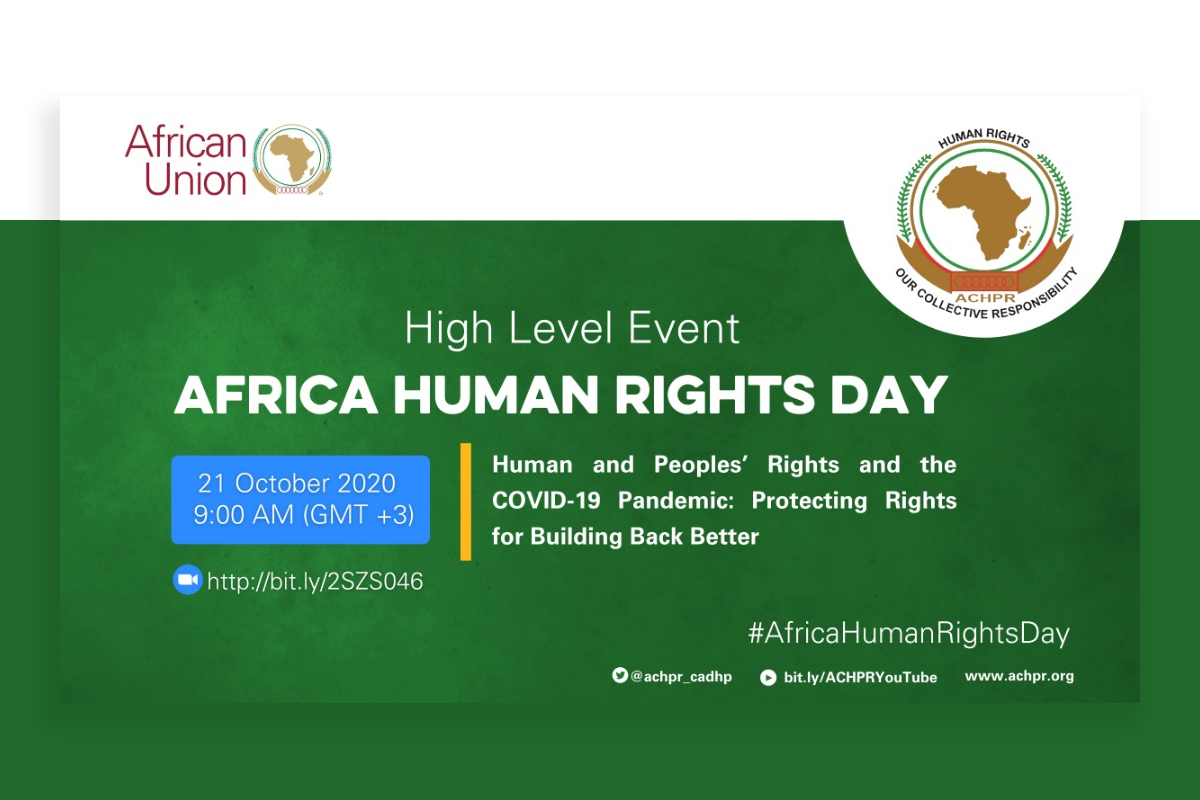(Op-Ed by Solomon A. Dersso, Chairperson of the African Commission on Human and Peoples’ Rights)
For this year’s Africa Human Rights Day, the African Commission on Human and Peoples’ Rights commemorates this landmark event under the theme ‘Human and Peoples’ Rights and the COVID-19 Pandemic: Protecting Rights for Building Back Better’. This occasion serves to deliberate on why and how respect for and protection of human and peoples’ rights offers the recipe for a successful strategy for building back better.
The arrival of the COVID-19 pandemic on the shores of Africa has exposed various pressing human rights issues. If countries on the continent are to succeed both in overcoming the severe impacts of the pandemic on the health, social and economic wellbeing of their people and in building back better, it is a pre-requisite that they start by addressing these fundamental human rights issues.
Apart from exposing the lack of preparedness of our health systems to deal with this pandemic, COVID-19 has also proved to be a magnifier of the fragilities of our societies. While COVID-19 affects all of us, its impact is particularly dire on the most vulnerable among our societies – including people working in the informal sector, the majority of people in our societies, many of them women, those living in highly congested areas, those with no access to water and sanitation, people with underlying conditions, IDPs, refugees, migrants and asylum seekers and children.
These sections of our people are most affected in multiple ways.
- Because of lack of access to water and sanitation, their living conditions do not allow them to observe the hygiene requirements for protecting themselves from COVID-19;
- Because they live in highly congested spaces, they neither are able to observe the social distancing measures;
- Because of the measures that have been taken in response to COVID-19, their livelihoods have been disrupted, exacerbating their already precarious socio-economic wellbeing.
These conditions of widespread vulnerabilities arise from the failure of States to provide for socio-economic rights. This failure is a result of
- major gaps in the social and economic policy of our states and the resultant lack of investment in access to health care, social security, water, sanitation, education, housing and sustainable employment;
- the perpetuation of the legacies of colonialism and apartheid;
- the nature of the structure of our economies dependent on export of limited raw materials, and
- the economic development paradigm that our countries follow and the global financial and economic system champions.
In other words, the vulnerabilities of our societies that COVID-19 revealed are products of current and recent past wrong policy choices and governance failures on the part of our political and economic systems.
COVID-19 also put a spotlight on the major gaps in the governance systems of many of our countries for managing the pandemic or similar emergencies. Most African states lack a pandemic response and management strategy and plan. Another notable manifestation of these gaps involved the abusive behavior of members of law enforcement and state security institutions. In some countries, the undue resort to the use of excessive force by law enforcement institutions in the name of enforcing COVID-19 regulations led to more death than COVID-19. As pointed out in Resolution 449, other incidents of violations reported in the context of the pandemic include assault and bodily injury, including sexual violence, arbitrary and illegal arrest or deprivation of liberty, torture, inhumane and degrading treatment.
Another manifestation of the gaps in the governance system is the emergence of grand corruption from the use of resources mobilised for responding to the pandemic.
Apart from the wide range of existing governance issues and human rights violations that the COVID-19 pandemic exposed, it has also created new human rights issues. Most notably, the pandemic and the response measures have produced and continue to produce severe socio-economic and humanitarian consequences.
In the face of the unprecedented economic consequences of the pandemic, hundreds of millions of people face loss of their jobs and livelihoods. Tens of millions of people are projected to be pushed to extreme poverty. Food insecurity has been aggravated. Many vulnerable people, particularly those in conflict affected countries and food insecure regions, face being pushed to the brink of starvation. The youth, who constitute a sizable portion of the population on the continent, face not only loss of current opportunities but also a future with no or limited social and economic prospects.
The pandemic also laid bare the pervasiveness of gender oppression nearly across the continent. As noted in Resolution 449, we have witnessed major upsurge in gender-based violence, sexual violence, domestic violence, rise in harmful practices such as FGM and early marriage, the increase in household and reproductive care burden of women and girls and disruption of sexual and reproductive health services, including pre and post-natal care for women.
In the face of the foregoing, there can be no chance of success for building back better without addressing all of these issues. In terms of the weaknesses of the Continent’s health systems, building back better entails investing in universal access to health services for all, as a priority area of public interest for the wellbeing and security of societies. The right to health and access to health services is fundamental human right, critical public good that should be made available for all in the interest of fulfilling the right to health for all and safeguarding public health from pandemics like COVID-19. As pointed out in Resolution 449 of the ACHPR, this requires among others fulfilling the promise of the Abuja declaration in which states pledged to allocate 15% of national budget for the provision of health services.
In terms of the right to health, other areas where the continent is also found wanting include in terms of access to therapeutics, diagnostic test kits and eventually vaccines. This is also an area that requires very serious policy attention and prioritisation both in responding to COVID19 and in planning for a post-COVID-19 order in which the health security and access of the continent to these critical medical supplies from within the continent is guaranteed. Accordingly, Resolution 449 calls for the development of ‘a strategy for ensuring that when a COVID-19 vaccine is found, arrangements are made for the production and distribution of the vaccine.’
Additionally, building back better also requires that States Parties to the African Charter on Human and Peoples’ Rights (African Charter) put in place the required legislative, regulatory and institutional frameworks for the transparent and human rights compliant management of pandemics and other emergency situations with due regard to the principles of legality, necessity, proportionality and non-discrimination. With particular reference to the security sector, it entails, in the words of Resolution 449, reforms are introduced to address the serious gaps in the laws governing the security sector, the doctrine of security and law enforcement institutions and the training of their personnel particularly in respect of their role in the management of pandemics and exercise of pandemic response responsibilities.
There can be no building back better unless existing conditions of socio-economic deprivations that pervade much of our societies are addressed robustly and urgently. This means that African states cannot continue to postpone or neglect the prioritisation of investing in access to water, sanitation, social protection, employment, education focusing in particular on bringing access to those with no access so that no one is left behind. Such intervention, according to Resolution 449, is a ‘necessary condition for safeguarding the health and life of the public.’
In the areas of social and economic life of society, building back better additionally requires serious reconsideration of the GDP growth-based approach to economic development, the accompanying neo-liberal economic policy orientation towards the commodification of basic social services, hence the delivery of socio-economic rights. Accordingly, building back better necessitates that States Parties ‘[a]dopt human rights-centred economic recovery plans that focus on reversing the adverse impacts of the pandemic on the socio-economic wellbeing of people, improve standard of living, inclusiveness and reduces inequalities by investing in access to socio-economic rights and the administrative and economic infrastructure for delivery of access to these rights.’
As we commemorate Africa Human Rights Day, it is incumbent on all of us as member states, national human rights institutions, civil society organisations and the media that we take responsibility for ensuring that building back better focuses on addressing the human rights issues that COVID-19 has exposed. The resilience of our societies for any future shocks cannot be guaranteed without our ability to address these issues, which is pre-requisite both for overcoming the impacts of the pandemic but also for effective social and economic as well as governance reconstruction necessary for achieving a just and inclusive system of democratic governance and human centered paradigm of development.
Invitation: Africa Human Rights Day High-Level Event
The African Commission on Human and Peoples’ Rights (the ACHPR) wishes to invite State Parties to the African Charter on Human and Peoples’ Rights, Organs of the African Union, National Human Rights Institutions, International Organisations, Non-Governmental Organisations and the general public, to a webinar event in commemoration of the Africa Human Rights Day. Africa Human Rights Day commemorates the 34th Anniversary of the entry into force of the African Charter on Human and Peoples' Rights on 21 October 2020.
Theme: ‘Human and Peoples’ Rights and the COVID-19 Pandemic: Protecting Rights for Building Back Better’



